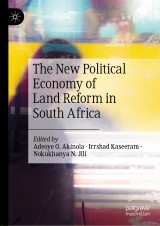Details

The New Political Economy of Land Reform in South Africa
|
96,29 € |
|
| Verlag: | Palgrave Macmillan |
| Format: | |
| Veröffentl.: | 18.09.2020 |
| ISBN/EAN: | 9783030511296 |
| Sprache: | englisch |
Dieses eBook enthält ein Wasserzeichen.
Beschreibungen
This book analyzes the new political economy of land reform in South Africa. It takes a holistic approach to understand South Africa’s land reform, assesses the current policy gaps, and suggests ways of filling them. Due to its cross-disciplinary approach, the book will appeal to a broad audience, and will benefit readers from the fields of policy reform, administration, law, political science, political economics, agricultural economics, global politics, resource studies and development studies.
Chapter 1. Expropriation and the Discontent of Land Reform in South Africa: An Introduction.- Chapter 2. Expropriation as an Effective Tool for Land Reform: A Legislative Perspective.- Chapter 3. Globalization of South African Land Reform Scheme: An Interrogation.- Chapter 4. The Expropriation of Land without Compensation in South Africa: A Strategy for Alleviating or Worsening Poverty?.- Chapter 5. South African Land Question and the Dilemma of Land Expropriation without Compensation: A Critical Examination.- Chapter 6. Land Expropriation, Food Security and Local Economic Development (LED) in South Africa.- Chapter 7. South Africa and the Quest for Land Reform: Implications for Integrative Food Security and Nation-Building.- Chapter 8. Motivations for Land Reform in Contemporary South Africa: The case of Balobedu in Tzaneen, Province of Limpopo.- Chapter 9. Small-Scale Farming, Fourth Industrial Revolution and the Quest for Agriculture Development.- Chapter 10. Rural Land Reform and Local Economic Development through Agri-parks – A Case Study of Harry Gwala Municipality in KwaZulu-Natal.- Chapter 11. Balancing Land Restitution and Public Interest in South African Socio-economic Development: A Critical Appraisal of the Restitution of Land Rights Act.- Chapter 12. Climate Change and Land Issues in South Africa: A Convergence.- Chapter 13. Urbanization, Poverty and the Paradox of Land Reform in South Africa. Chapter 14. Land Reform and the Quest for Women’s Land Rights in KwaZulu-Natal, South Africa.
Adeoye O. Akinola is Post-Doctoral Fellow, Department of Public of Administration, University of Zululand, South Africa. <div><br><div>Irrshad Kaseeram is Professor and Dean at the Department of Administration and Law, University of Zululand, South Africa.<br></div><br></div><div>Nokukhanya N. Jili is Head of the Department of Public Administration, University of Zululand, South Africa.<br></div>
This book analyzes the new political economy of land reform in South Africa. It takes a holistic approach to understand South Africa’s land reform, assesses the current policy gaps, and suggests ways of filling them. Due to its cross-disciplinary approach, the book will appeal to a broad audience, and will benefit readers from the fields of policy reform, administration, law, political science, political economics, agricultural economics, global politics, resource studies and development studies.<div><br></div><div>Adeoye O. Akinola is Post-Doctoral Fellow, Department of Public of Administration, University of Zululand, South Africa. <br></div><div><div><br><div>Irrshad Kaseeram is Professor and Dean at the Department of Administration and Law, University of Zululand, South Africa.<br></div><div><br></div>Nokukhanya N. Jili is Head of the Department of Public Administration, University of Zululand, South Africa.</div></div>
Analyzes the new political economy of land reform in South Africa Identifies current policy gaps and offers practical policy options for addressing inequality and achieving sustainable food security, agrarian reform, and socio-economic and political stability Addresses the feasibility and implications of Land Expropriation Without Compensation in South Africa
Diese Produkte könnten Sie auch interessieren:

Inclusión educativa de niños, niñas y adolescentes migrantes venezolanos, en Colombia

von: Douglas Jiménez

15,99 €
















